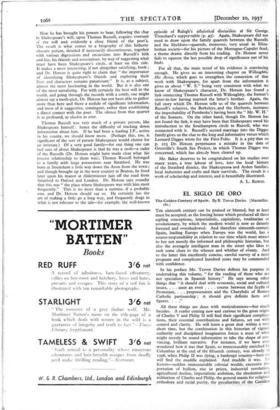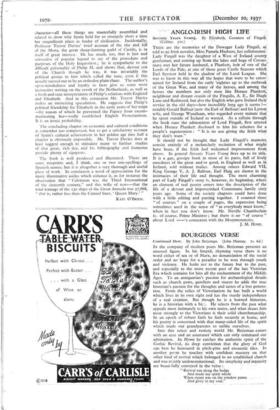EL SIGLO DE ORO
The Golden Century of Spain. By R. Trevor Davies. (Macmillan. 6s.)
THE sixteenth century can be praised or blamed, but at least must be accepted, as the forcing house which produced all those sapling conceptions, imperialistic, capitalistic, totalitarian or revolutionary, by which the modern world is now so densely forested and overshadowed. And therefore sixteenth-century Spain, leading Europe when Europe was the world, has a source-responsibility in relation to our time which must attract to her not merely the informed and philosophic historian, but also the averagely intelligent man in the street who likes to seek some clues to the whence and whither of events. And to the latter this excellently concise, careful- survey of a most pregnant and complicated hundred years may be commended with confidence.
In his preface Mr. Trevor Davies defines his purpose in undertaking this volume, "for the reading of those who ire not specialists in Spanish history." He says among other things that "it should deal with economic, social and cultural issues, . . . steer an even . . . . course between the Scylla of Protestant, . . . prepossessions and the Charybdis of Roman Catholic partisanship ; it should give definite facts and figures. . . ."
All these things are done with meticulousness—but much besides. A reader coming new and curious to the great reigns of Charles V and Philip II will find their significant complica- tions, their essential contributions and failures, set out with control and clarity. He will learn a great deal within a very short time, but the combination in this historian of vigour, authority and disciplined imagination forces a mass of what might merely be sound information to take the shape of con- vincing, brilliant narrative. For instance, if we have ever wondered how it was that Spain, so immeasurably enriched by Columbus at the end, of the fifteenth century, was already in 1598, when Philip IX was dying, a bankrupt country—here we will find the muddle explained. And muddle it was. Its factors—sudden immeasurable colonial wealth, excessive im- portation of bullion, rise in prices, industrial revolution, agricultural decline, imperialistic ambition, the absolutism and militarism of Charles and Philip, the general mania for religious orthodoxy _and _racial purity, the peculiarities of the Castiliau character—all these things are, masterfully assembled _anct- related to show why Spain held for so strangely short a time her magnificent place as leader of _civilisation.. Incidentally,. Professor Trevor Davies' brief account of the rise and fall of the Mesta, the great sheep-farming guild of Castile, is in itself of great interest. He has much, too, that is just and corrective of popular legend to say of the procedure and purposes of the Holy Inquisition..; he is sympathetic to the difficult peiionality of ,Philip II, and shows. that, devout son of the Church though he was, it was invariably the political genius in him which called the tune, even if this usually turned out to be an orthodox plairi chant. The author's open-mindedness and loyalty to facts give us some most instructive writing on the revolt of the Netherlands, as well as a fresh and sane interpretation of Philip's relations with England and Elizabeth. And in this connexion Mr. Trevor Davies makes anintereeting speculation. He suggests that Philip's political friendship for Elizabeth in the early years of her reign —by reason of which he prevented the Papacy from excom- municating her—really established English Protestantism. It is an ironic probability.
The concluding chapter on economic and cultural conditions is somewhat too compressed, but to get a satisfactory account of Spain's cultural achievement in her golden age into half a chapter is obviously impossible. Mr. Trevor Davies does at least suggest enough to stimulate many to further studies of that great, rich day, and his bibliography and footnotes provide plenty of signposts.
The book is well produced and illustrated. There -are some misprints and, I think, one or two mis-spellings of Spanish names, but it is altogether a very thorough-and useful piece of work. In conclusion a word of appreciation for the many illuminative asides which enhance it, as for instance the observation that "Calvinism was the Third International of the sixteenth century," and this trifle of news—that the total tonnage of the 130 ships of the Great Armada was 57,868, "that is, rather less than the Cunard liner, 'Queen Mary.!"
KATE O'BRIEN..























































 Previous page
Previous page